Text
I just read them all, and they're gorgeous! I had forgotten Holmes met Victor Trever because Trevor's dog bit him, what an introduction, lol. Both men are so young and confused here, yet they handled that awkward situation with such mutual care, it's adorable! What a sweet story it was! And I love the style so much? Anyway, beautiful work!

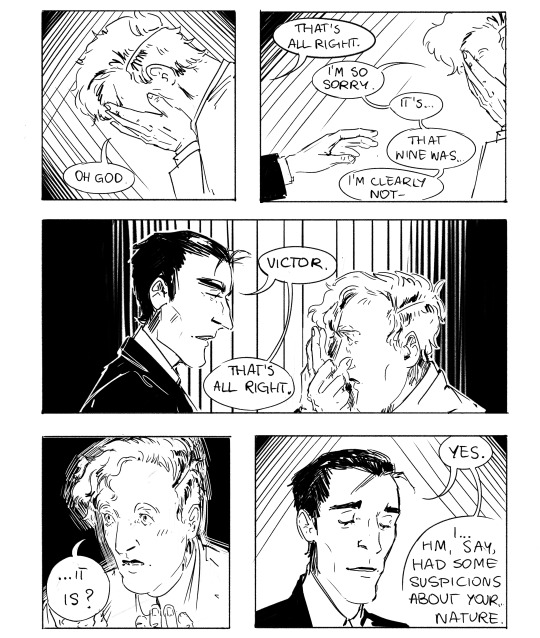

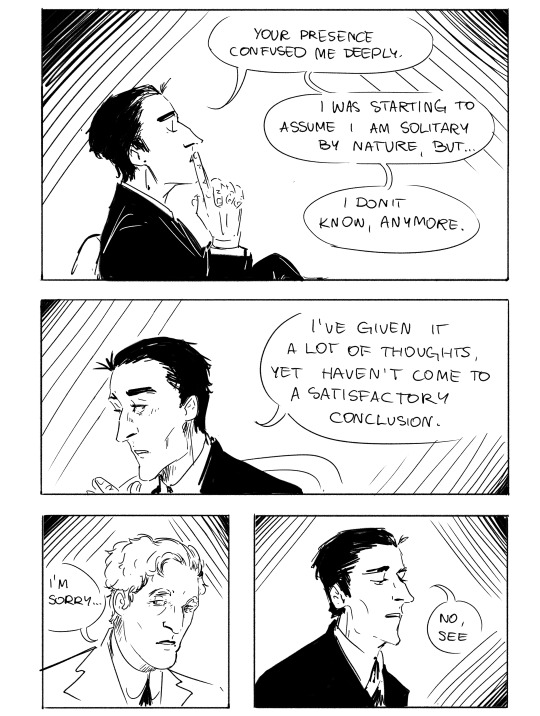
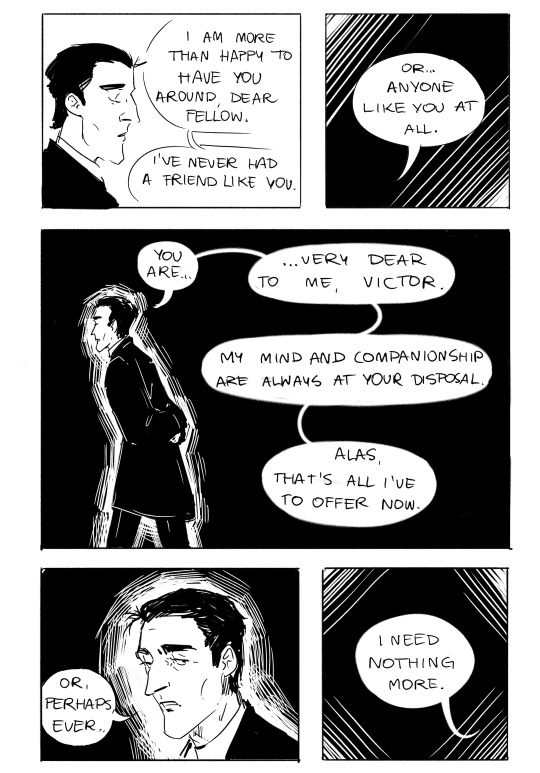
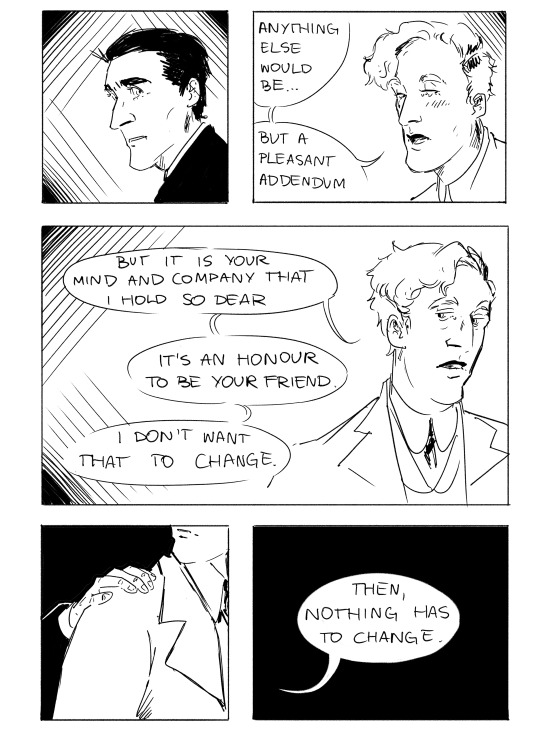
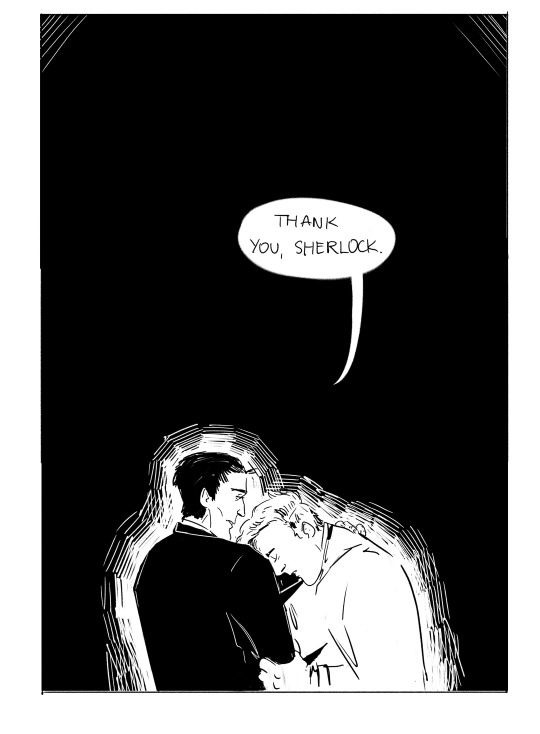
I cannot believe I managed to finish this so quickly????
I have a couple more ideas for some short comics with them but the main thing is... finished, I think?
Doing such a speedrun on those was crazy but I had fun (plus, is there a better way to use your free days? I doubt). I hope you had fun reading.
(part 1 - part 2 - part 3 - part 4 - part 5)
(I'm sorry for not putting these one-by-one for easier reading but the post would be ridiculously long)
#comic#sherlock holmes#the Gloria Scot#victor trevor#aroace Holmes#'I have a couple of other ideas to keep us occupied' Holmes' shocked face was so relatable there lol
172 notes
·
View notes
Photo
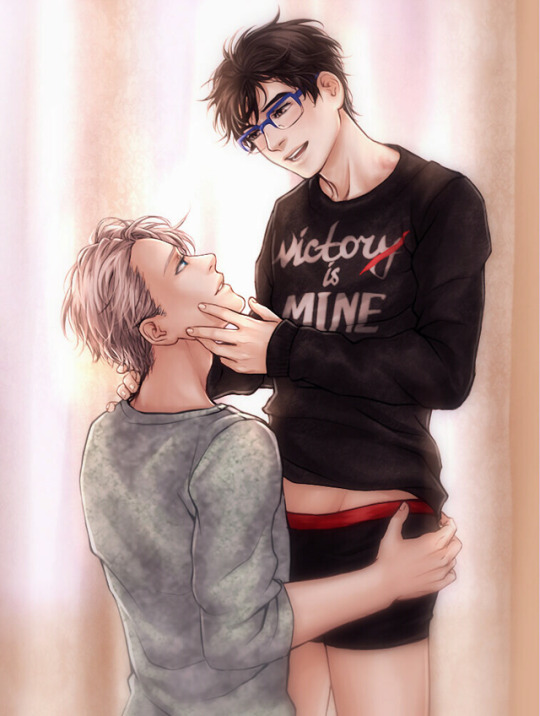
Victory’s mine or Victor is mine?
4K notes
·
View notes
Text
What really sets off my 'Holmes is so ace!' reaction to that passage was not his 'do not judge a book by its cover' moral, but his 'Oh I didn't notice that she was attractive' reaction. To call someone attractive is not really a judgement. You're not saying someone is good or bad if they're attractive - it's more of a description of your reaction to them, which Holmes entirely lacked here. It's so relatable to my ace self to just not have that on my mind - to the point that, for example, I've repeatedly fallen into awkward silence when asked which actor/singer/teacher whatever I found the most attractive, and have probably given some pretty weird answers. It's just such an alien way for me to look at people. Everyone just looks kind of alike - skin, face, a body, just human - that I just kind of go ??? when forced to consider it, and traits like kindness just stand out much more. And of course it's all subjective - but I would be willing to bet that most young allos wouldn't name the oldest, scrawny, short, sharp-faced guy attractive solely because of his sense of humour, lol.
There is so much characterization tucked into "The Statement of the Case" in the 2nd of Letters from Watson about The Sign of the Four. To marshal my thoughts at all, let's go by character, starting with my cinnamon roll Dr. Watson, then turning to Holmes and to Mary Morstan.
Watson
Watson's close observation of Miss Morstan demonstrates that he's capable of making deductions from observation. He deduces from the simplicity of her attire that she has limited means, and he has a good deal to say about how the character promised by her features and manner.
In an experience of women which extends over many nations and three separate continents, I have never looked upon a face which gave a clearer promise of a refined and sensitive nature.
This is a tiny bit amusing because all of Miss Morstan's actions suggest she has the orderly soul of someone who would have been an accountant in an era more supportive of women's careers. This woman keeps receipts. She may be nervous about bringing her concerns to the Great Detective, but she's not the slightest bit delicate.
Watson seems a bit pricked in the ego by Holmes' extensive knowledge of cigar ash, as he's touting his experience with women. That would be a monograph, indeed, something sold discreetly, in a corner of the bookshop behind a curtain. I'm going to guess that the third continent, after Europe and Asia, is Africa, both because the British did a good deal of colonial meddling there and because it makes Holmes suggestion of The Martyrdom of Man so much more apposite.
Holmes
The Martyrdom of Man turns out to be a progressive best seller about world history. Author Winwood Reade's perspective is to show the importance of Africa in the development of the world. This is entirely at odds with Victorian self-confidence about the white European and American missions of colonialism. Holmes is implying, deliberately or not, that Watson knows less about at least two continents than he thinks he does.
Reade's prose feels comparatively modern -- it has the sprightly feel of early 20th century writing rather than the long, turgid sentences of the 19th century. I've been distracted by reading bits of it, as while it's not how an historian would handle its topics today, it's an interesting read.
A side note on Winwood Reade is that he was open about being an atheist, so his book is also at odds with the popular idea of Divine Providence smiling about the endeavors of the British Empire. Contemporary audiences would surely have drawn some conclusions about Holmes' religious and political leanings.
The book recommendation is preceded by Holmes establishing that he's not a sentimentalist:
He smiled gently. “It is of the first importance,” he said, “not to allow your judgment to be biased by personal qualities. A client is to me a mere unit,—a factor in a problem. The emotional qualities are antagonistic to clear reasoning. I assure you that the most winning woman I ever knew was hanged for poisoning three little children for their insurance-money, and the most repellant man of my acquaintance is a philanthropist who has spent nearly a quarter of a million upon the London poor.”
My first reaction was "welp, he really is ace, isn't he?" On reflection, I think that reaction is both right and wrong. On the side of "right," there is no way that Holmes, as written, is a neurotypical allosexual heterosexual. Asexuality is not the only possible category for him, but it's a solid contender.
On the side of "wrong," what he's arguing for from "I assure you" on is simply not to judge a book by its cover. We're used to that as a moral. We're also accustomed to believing that "body language" and such can give clues to the person within. Heck, Holmes was just on about handwriting analysis. So there's a messy little tension here between two views that were common then as now: "outer aspects reveal the person's true nature" and "don't judge a book by its cover."
Mary Morstan
I like Mary Morstan a good deal, not least because she keeps receipts.
This image from the New York Public Library gives a sense of Mary's plain beige walking suit, though the feathers are far too big.
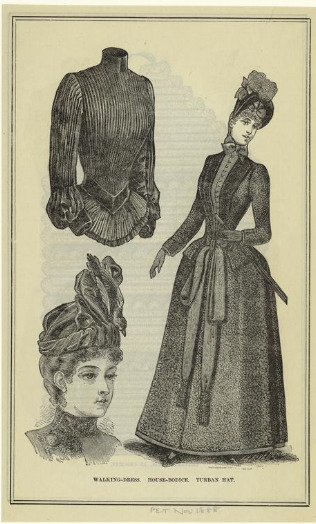
My first reaction to Mary Morstan's backstory was to check the publication date of Frances Hodgson Burnett's A Little Princess, because how many little girls were being left in boarding schools by their UK Army officer fathers who were serving in India?
Quite a few, it seems. It was standard practice to send children back to the UK to boarding school "for their health." That last euphemism raised my "what in the racist colonial claptrap" hackles, but there was a legit health concern -- malaria. Malaria is potentially deadly for anyone and worse for children, since a child who survived might have ruined health and intellectual development for life. It was not until 1897 that surgeon Ronald Ross established that malaria was transmitted by mosquitos. Miss Morstan was a child in India in the 1860s; she really would have been sent away for her own safety.
Meanwhile, although A Little Princess was published in 1905, it was expanded from a short story published in 1887. a few years before The Sign of the Four was written. That doesn't mean there's a connection: stories about a common situation and the fears arising from it are going to have similarities.
Miss Morstan's lack of English relatives did have me wondering if her mother was Indian, especially as her complexion lacks "beauty" (isn't translucently pale). Since she's blonde and light-eyed, presumably we're to assume that both parents were English or Scottish. (The genetics of eye color inheritance weren't established at all until 1907, but people obviously had folk beliefs about how much children looked like their parents, and in what ways, before that. Using today's knowledge, it seems possible that her mother had one English parent and one Indian parent, but who knows?).
At twenty-seven, she is "on the shelf" -- past the ordinary age of courtship and marriage. Her job as either a companion or a governess implies she brings no financial assets to a marriage beyond those mysterious pearls. Watson's musings that twenty-seven is "a sweet age" establishes both that he's head-over-heels for Miss Morstan and that he's enough a man of the world to prefer a woman "a little sobered by experience" to a blushing debutante.
So do the mysterious pearls mean we're going down a path superficially similar to Wilkie Collins' The Moonstone (1868), where a heroine inherits a mysterious gem from a British Army office relative? Rachel Verinder's uncle was a horrible person who came by his gem in the worst way; but Mary Morstan's father was a guard at a prison for political prisoners, which doesn't bode well for his connections. Mary has far too much good sense than to wear her pearls, though.
I do want my cinnamon roll Dr. Watson to get the girl.
#wow! so many things to think about!#letters from watson#the sign of the four#mary morstan#sherlock holmes#dr watson#history
13 notes
·
View notes
Text
In both #3 and #4 of the Letters from Watson for The SIgn of the Four, Watson loses his mind and babbles when he's trying to have a conversation in the presence of Mary Morstan, and I'm here for it.
For the rest of these two letters, especially #4, I feel like I've stumbled into a story by Edgar Allen Poe or Wilkie Collins. Mr. Thaddeus Sholto feels like exactly what would happen if a colorful Wilkie Collins character -- say, the terrifyingly affable, rotund Count Fosco from The Woman in White -- stumbled into Holmes' world of deduction and logic.
Thaddeus Sholto had me digging for physiognomy texts, as that protruding lower lip feels like a detail meant to say something specific in an era that took "facial composition as a sign of character" very seriously.
The Pocket Lavatar (1817) gives us one possible interpretation:
When the lower lip projects beyond the upper, it denotes negative goodness.
Also, relevant to Sholto's watery blue eyes:
Blue eyes are frequently found in persons of phlegmatic character; they are often indications of feebleness and effeminacy.
Physiognomy and phrenology both had multiple rounds of being in fashion in the 19th century, with different gurus disagreeing on what exactly your nose or the shape of your skull meant. The whole field is, of course, wildly racist, with a garnish of ableism and a drizzle of classism. It was also a fairly familiar vocabulary to contemporary readers.
Meanwhile, I feel like every reference to Thaddeus Sholto's snobby little habits is meant to make the reader chuckle at his pretentiousness and poor taste, but I can't prove it.
Since the premise of this story seems to require acting as if plundering India for gems and wealth is okay, my hackles went up at referring to Major Sholto's long-time Indian servant as Chowdar. Turns out this was a common transliteration of a name we'd now render more like Chaudhuri.
(Major Sholto had had malaria, by the way, as evidenced from the quinine bottle present when he received his startling letter. It's likely that malaria contributed to his fragile health.)
Major Sholto's relationship with his manservant Lal Chowdar is solid enough that they hide a body together, but I have to raise an eyebrow at the major's naivete.
If my own servant could not believe my innocence, how could I hope to make it good before twelve foolish tradesmen in a jury-box?
His own servant saw how he behaved in India and probably has an accurate view of his ethics. That he'd kill out of greed happens to be wrong in this case (assuming a reliable narrator, which is a big assumption).
A face was looking in at us out of the darkness. We could see the whitening of the nose where it was pressed against the glass. It was a bearded, hairy face, with wild cruel eyes and an expression of concentrated malevolence.
My bet was "monkey," but then the Sholtos found boot prints, so either it's a monkey that wears shoes, or it's a man. Oh well.
My hackles weren't up about taking Miss Morstan's mysterious pearls from a "chaplet," but they should have been. I blush to admit that I was envisioning some sort of tiara -- but I googled before making a fool of myself and discovered that a chaplet is prayer beads. It's like a rosary, but not all chaplets are rosaries, and not all rosaries are chaplets. Is this an Anglican chaplet made from stolen gems, or were Sholto, Morstan, and their friends straight-up stealing prayer beads of another culture?
Honestly, I'm up for the Sholtos being actively cursed, but since Holmes is a rationalist, I'm also up for the more plausible outcome of their actions having brought mundane vengeance down upon their heads.
#ah this clears things up!#letters from watson#sherlock holmes#the sign of the four#oscar wilde#thaddeus sholto#history
21 notes
·
View notes
Text
A set of steps stood at one side of the room, in the midst of a litter of lath and plaster, and above them there was an opening in the ceiling large enough for a man to pass through. At the foot of the steps a long coil of rope was thrown carelessly together.
By the table, in a wooden arm-chair, the master of the house was seated all in a heap, with his head sunk upon his left shoulder, and that ghastly, inscrutable smile upon his face. He was stiff and cold, and had clearly been dead many hours. It seemed to me that not only his features but all his limbs were twisted and turned in the most fantastic fashion. By his hand upon the table there lay a peculiar instrument,—a brown, close-grained stick, with a stone head like a hammer, rudely lashed on with coarse twine. Beside it was a torn sheet of note-paper with some words scrawled upon it. Holmes glanced at it, and then handed it to me.
“You see,” he said, with a significant raising of the eyebrows.
In the light of the lantern I read, with a thrill of horror, “The sign of the four.”
“In God's name, what does it all mean?” I asked.
“It means murder,” said he, stooping over the dead man. “Ah, I expected it. Look here!” He pointed to what looked like a long, dark thorn stuck in the skin just above the ear.
“It looks like a thorn,” said I.
“It is a thorn. You may pick it out. But be careful, for it is poisoned.”
Murder by poison. How very surprising. Well, at least the mystery of how the murderer got into the locked room is solved
4 notes
·
View notes
Text
The third flight of stairs ended in a straight passage of some length, with a great picture in Indian tapestry upon the right of it and three doors upon the left. Holmes advanced along it in the same slow and methodical way, while we kept close at his heels, with our long black shadows streaming backwards down the corridor. The third door was that which we were seeking. Holmes knocked without receiving any answer, and then tried to turn the handle and force it open. It was locked on the inside, however, and by a broad and powerful bolt, as we could see when we set our lamp up against it.
A locked room murder mystery! This is going to be interesting. And a very vivid description of those three walking down the hallway, too. I wonder if any artworks have been made based on this passage
6 notes
·
View notes
Text
Sherlock Holmes took the lamp and led the way, for Thaddeus Sholto's teeth were chattering in his head. So shaken was he that I had to pass my hand under his arm as we went up the stairs, for his knees were trembling under him. Twice as we ascended Holmes whipped his lens out of his pocket and carefully examined marks which appeared to me to be mere shapeless smudges of dust upon the cocoa-nut matting which served as a stair-carpet.
Smudges of dust upon cocoa-nut matting, hmm... could that be blood? Or a particular kind of mud Holmes would be able to recognise, perhaps?
#letters from watson#sherlock holmes#the sign of the four#the tragedy of pondicherry lodge#things are getting exciting!
3 notes
·
View notes
Text
Our guide had left us the lantern. Holmes swung it slowly round, and peered keenly at the house, and at the great rubbish-heaps which cumbered the grounds. Miss Morstan and I stood together, and her hand was in mine. A wondrous subtle thing is love, for here were we two who had never seen each other before that day, between whom no word or even look of affection had ever passed, and yet now in an hour of trouble our hands instinctively sought for each other. I have marvelled at it since, but at the time it seemed the most natural thing that I should go out to her so, and, as she has often told me, there was in her also the instinct to turn to me for comfort and protection. So we stood hand in hand, like two children, and there was peace in our hearts for all the dark things that surrounded us.
Don't have the heart to make fun of Watson for his fast affection for miss Morstan. It is just very adorable. And also quite sad, because Holmes is literally right there, and yet Watson clearly does not feel it appropriate to seek that comfort by him. Maybe he does not think it would be welcomed? Maybe the possibility does not even occur to him? *mumbles something about stigma around men touching other men, and men not daring to admit needing comfort outside of man/woman romance* There's a lot to say about how this passage is so explicitly described as love, despite Morstan and Watson not knowing each other for more than a day, and then later in canon, we get to see Holmes and Watson behaving in exactly the same way those two do here (at Milverton's house, when they are hiding behind the curtains, for example). If this is love, that is love too
#letters from watson#sherlock holmes#mary morstan#intimate friends#the sign of the four#the tragedy of pondicherry lodge#having a lot of feelings about all this#dr watson#ideas of masculinity#gender
6 notes
·
View notes
Text
He held up the lantern, and his hand shook until the circles of light flickered and wavered all round us. Miss Morstan seized my wrist, and we all stood with thumping hearts, straining our ears.
I bet that Watson seized Holmes' wrist in turn and just neglected to mention it
#letters from watson#sherlock holmes#the sign of the four#intimate friends#the tragedy of pondicherry lodge
3 notes
·
View notes
Text
“Very sorry, Mr. Thaddeus,” said the porter, inexorably. “Folk may be friends o' yours, and yet no friends o' the master's. He pays me well to do my duty, and my duty I'll do. I don't know none o' your friends.”
“Oh, yes you do, McMurdo,” cried Sherlock Holmes, genially. “I don't think you can have forgotten me. Don't you remember the amateur who fought three rounds with you at Alison's rooms on the night of your benefit four years back?”
“Not Mr. Sherlock Holmes!” roared the prize-fighter. “God's truth! how could I have mistook you? If instead o' standin' there so quiet you had just stepped up and given me that cross-hit of yours under the jaw, I'd ha' known you without a question. Ah, you're one that has wasted your gifts, you have! You might have aimed high, if you had joined the fancy.”
“You see, Watson, if all else fails me I have still one of the scientific professions open to me,” said Holmes, laughing.
I keep forgetting that Sherlock Holmes is an amateur boxer. This man has such a wild skill set, and also such a great sense of humour, I love him
#letters from watson#sherlock holmes#this passage is so delightful!#the sign of the four#the tragedy of pondicherry lodge
2 notes
·
View notes
Text

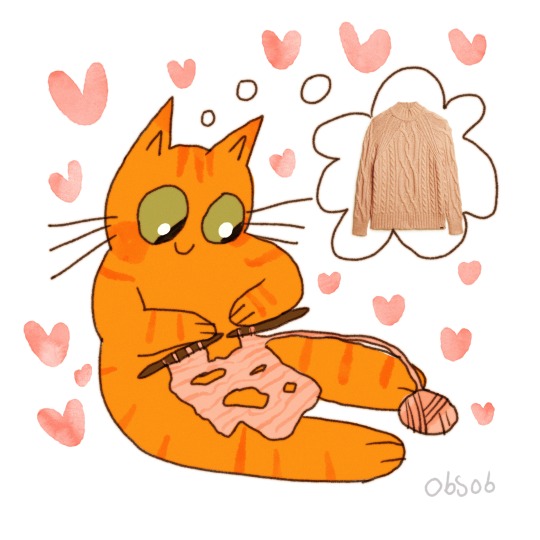
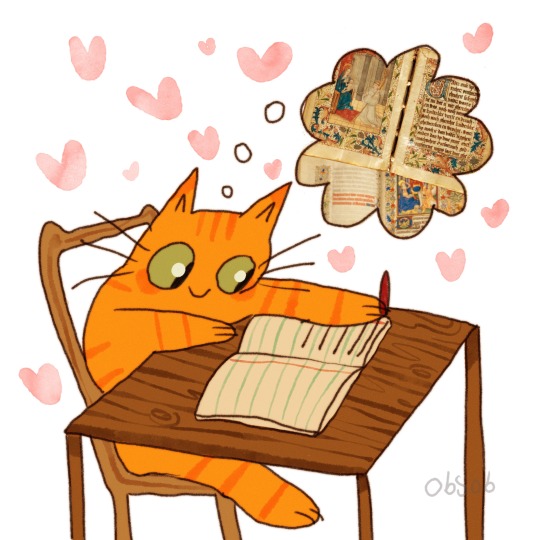
the joy of creation :3 !! (anything worth doing is worth doing badly)
4K notes
·
View notes
Text
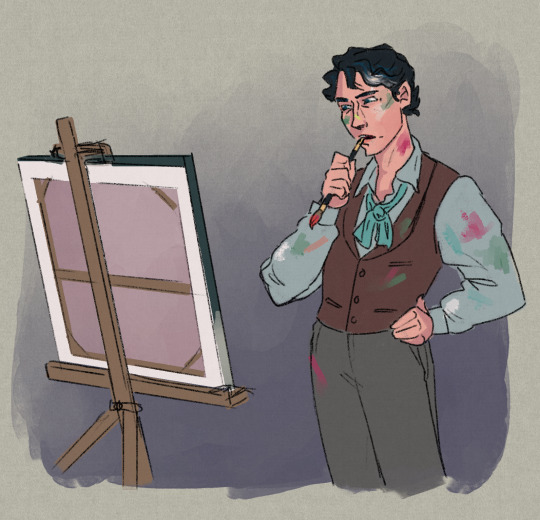
“Looks pretty fresh for an Old Master, doesn’t she?” said Raffles.
His tone was strange. I could only suppose that he was jealous of my success.
“So Craggs said. I hardly looked at it myself.”
“Well, look now—look closely. By Jove, I must have faked her better than I thought!”
-Nine Points of the Law
raffles originally saying hes only posing as an artist but then doing a perfect forgery in one afternoon is so funny to me. cannot stop himself from lying for no damn reason gjhgjf
#art#letters from bunny#raffles#cricket and crime#nine points of the law#the amateur crackman#the gentleman thief#aww love that#it really is very funny!
44 notes
·
View notes
Text
#bisexual and aroace disaster @dathen Exactly! xD
#yes okay that IS really funny#watson is trying to impress mary#holmes is trying to impress watson#(why else mumbling the names aloud?) @i-dont-talk-for-days-on-end I hadn't thought of it like that, but you're so right! And the funny thing is that, while Watson's success was questionable (Morstan was still roasting him for it later), Holmes' attempt was working - even while Watson was actively flirting with miss Morstan, Watson WAS impressed - just consider 'Holmes alone could rise superiour to petty influences' and 'Sherlock Holmes was never at fault, however'
Miss Morstan’s demeanor was as resolute and collected as ever. I endeavored to cheer and amuse her by reminiscences of my adventures in Afghanistan; but, to tell the truth, I was myself so excited at our situation and so curious as to our destination that my stories were slightly involved. To this day she declares that I told her one moving anecdote as to how a musket looked into my tent at the dead of night, and how I fired a double-barrelled tiger cub at it. At first I had some idea as to the direction in which we were driving; but soon, what with our pace, the fog, and my own limited knowledge of London, I lost my bearings, and knew nothing, save that we seemed to be going a very long way. Sherlock Holmes was never at fault, however, and he muttered the names as the cab rattled through squares and in and out by tortuous by-streets.
I don't know exactly why, but the image of Watson trying to impress miss Morstan by telling tall tales and Holmes meanwhile just sitting there, naming the streets and squares they are passing by, is very amusing to me
48 notes
·
View notes
Text
My first impulse was, of course, to call for assistance; but I could not but recognize that there was every chance that I would be accused of his murder. His death at the moment of a quarrel, and the gash in his head, would be black against me. Again, an official inquiry could not be made without bringing out some facts about the treasure, which I was particularly anxious to keep secret. He had told me that no soul upon earth knew where he had gone. There seemed to be no necessity why any soul ever should know.
Mary Morstan deserves to raise Sholto from the death and kill him all over for this
#seriously dude???#letters from watson#sherlock holmes#the sign of the four#the story of the bald-headed man
1 note
·
View note
Text
When in India, he and I, through a remarkable chain of circumstances, came into possession of a considerable treasure. I brought it over to England, and on the night of Morstan's arrival he came straight over here to claim his share. He walked over from the station, and was admitted by my faithful Lal Chowdar, who is now dead. Morstan and I had a difference of opinion as to the division of the treasure, and we came to heated words. Morstan had sprung out of his chair in a paroxysm of anger, when he suddenly pressed his hand to his side, his face turned a dusky hue, and he fell backwards, cutting his head against the corner of the treasure-chest. When I stooped over him I found, to my horror, that he was dead.
The beloved Brittish tradition of taking what one finds, without questioning about whether it is theirs to take
Can't believe I was right about the captain's accidental death (if it really was accidental) at the major's house, and the major's concealment of it. Did he bury the body in his gardens? That he kept Mary Morstan deliberately in the dark about her father's fate out of mere greed was so cruel of him
I have the idea that the rest of this novel will be occupied with the details of that treasure and the drama/danger attached to it
2 notes
·
View notes
Text
“Early in 1882 my father received a letter from India which was a great shock to him. He nearly fainted at the breakfast-table when he opened it, and from that day he sickened to his death. What was in the letter we could never discover, but I could see as he held it that it was short and written in a scrawling hand. He had suffered for years from an enlarged spleen, but he now became rapidly worse, and towards the end of April we were informed that he was beyond all hope, and that he wished to make a last communication to us.
Ah, at least the 'father makes a confession to his children on his deathbed' part of my theory was right. I'm really wondering where this is going. The letters from India, just as the man's fear of man with wooden legs, points towards a bigger event than the accidental death of his friend. Some enemy he made back in India maybe? And captain Morstan either was in on the business, or got caught in the crossfire?
The way this son of major Sholto is written is sure something. Unattractive but surrounds himself with beauty, reclusive, no occupation that we know off, on the verge of a nervous breakdown - he seems like a deliberate stereotype, or parody maybe. Not sure of what exactly
1 note
·
View note
Text
In a flash I saw his plan.
"You're going for the picture while we're at dinner?"
"I am."
"If he hears you?"
"He sha'n't."
"But if he does!"
And I fairly trembled at the thought.
'Bunny' really is a very fitting name for this man
#letters from bunny#raffles#bunny manders#cricket and crime#be gay do crime#the amateur cracksman#the gentleman thief#he's trembling poor thing#bunny anxiety manders
2 notes
·
View notes